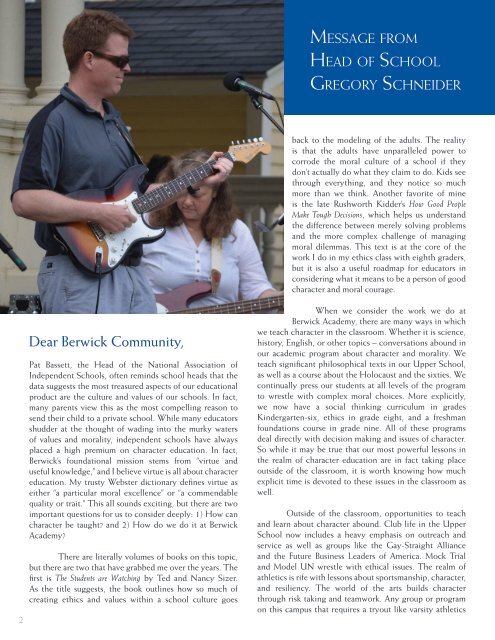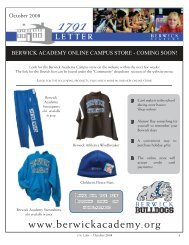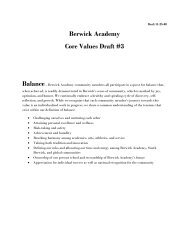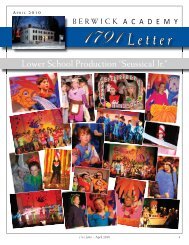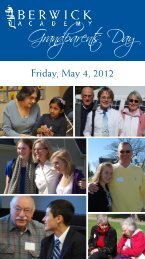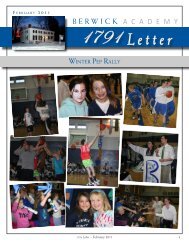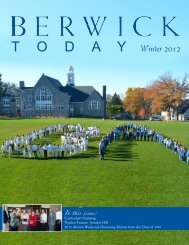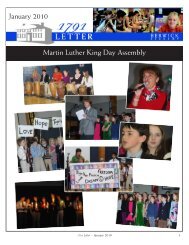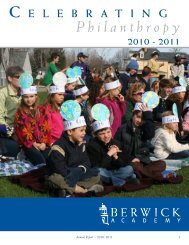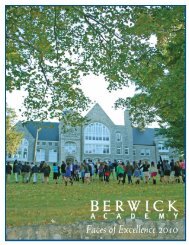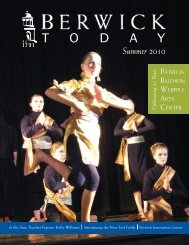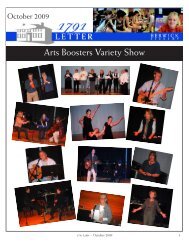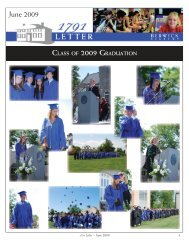Create successful ePaper yourself
Turn your PDF publications into a flip-book with our unique Google optimized e-Paper software.
2Dear <strong>Berwick</strong> Community,Pat Bassett, the Head of the National Association ofIndependent Schools, often reminds school heads that thedata suggests the most treasured aspects of our educationalproduct are the culture and values of our schools. In fact,many parents view this as the most compelling reason tosend their child to a private school. While many educatorsshudder at the thought of wading into the murky watersof values and morality, independent schools have alwaysplaced a high premium on character education. In fact,<strong>Berwick</strong>’s foundational mission stems from “virtue anduseful knowledge,” and I believe virtue is all about charactereducation. My trusty Webster dictionary defines virtue aseither “a particular moral excellence” or “a commendablequality or trait.” This all sounds exciting, but there are twoimportant questions for us to consider deeply: 1) How cancharacter be taught? and 2) How do we do it at <strong>Berwick</strong><strong>Academy</strong>?There are literally volumes of books on this topic,but there are two that have grabbed me over the years. Thefirst is The Students are Watching by Ted and Nancy Sizer.As the title suggests, the book outlines how so much ofcreating ethics and values within a school culture goesMessage fromHead of SchoolGregory Schneiderback to the modeling of the adults. The realityis that the adults have unparalleled power tocorrode the moral culture of a school if theydon’t actually do what they claim to do. Kids seethrough everything, and they notice so muchmore than we think. Another favorite of mineis the late Rushworth Kidder’s How Good PeopleMake Tough Decisions, which helps us understandthe difference between merely solving problemsand the more complex challenge of managingmoral dilemmas. This text is at the core of thework I do in my ethics class with eighth graders,but it is also a useful roadmap for educators inconsidering what it means to beWoofstocka personX -ofJunegood4, 2010character and moral courage.When we consider the work we do at<strong>Berwick</strong> <strong>Academy</strong>, there are many ways in whichwe teach character in the classroom. Whether it is science,history, English, or other topics – conversations abound inour academic program about character and morality. Weteach significant philosophical texts in our Upper School,as well as a course about the Holocaust and the sixties. Wecontinually press our students at all levels of the programto wrestle with complex moral choices. More explicitly,we now have a social thinking curriculum in gradesKindergarten-six, ethics in grade eight, and a freshmanfoundations course in grade nine. All of these programsdeal directly with decision making and issues of character.So while it may be true that our most powerful lessons inthe realm of character education are in fact taking placeoutside of the classroom, it is worth knowing how muchexplicit time is devoted to these issues in the classroom aswell.Outside of the classroom, opportunities to teachand learn about character abound. Club life in the UpperSchool now includes a heavy emphasis on outreach andservice as well as groups like the Gay-Straight Allianceand the Future Business Leaders of America. Mock Trialand Model UN wrestle with ethical issues. The realm ofathletics is rife with lessons about sportsmanship, character,and resiliency. The world of the arts builds characterthrough risk taking and teamwork. Any group or programon this campus that requires a tryout like varsity athleticsor Winterfest provides opportunity to explore not justdealing with success but dealing with failure and buildingresiliency.One compelling example of character educationhangs on the wall of my office in the form of a letter froman opposing athletic director. It was written in response toour Boys Varsity Soccer Team’s decision to forfeit a game afew years ago, based upon an official’s call that our studentsbelieved was unfair. While the opposing team did notaccept the offer (of which I was unaware), they did respondwith this sentiment:“When you made the decision to concede thegame to us, it reinforced that you put the sportsmanship ofyour program and the camaraderie of the league over yourdesire to win games, and that should serve as a model toall of us. By your actions, we believe that you have raisedthe standard of sportsmanship in the Eastern IndependentLeague.”I would argue that the engine behind all of theseinitiatives that work toward instilling character and valuesin our graduates has to be relationships. Whenever youattended this school, you had a teacher or teachers thatcame to know you well and inspired you to stretch. Theadults come to know our students in all sorts of arenas,and they help build the moral fiber of young people. Peerrelationships also form one’s sense of values, and we haveworked hard to create a culture on this Hilltop that valuespeople for who they are in an authentic way.In coming back to our fundamental missionof virtue and useful knowledge, one could argue thatcharacter education is in fact the essential bridge betweenthese parallel goals. While I have spent the bulk of thismissive detailing how character education informs values,ethics, and virtue, wouldn’t we also argue that there is nomore useful form of knowledge for our graduates todaythan learning how to be a person of character? More sothan any calculus question or ability to recount historicalfacts, issues of character will directly impact their abilityto be successful. While most private school graduates willreceive some kind of job opportunity upon graduation fromcollege, it will be those with deep character and resiliencywho will be promoted. They will be the ones who can dealwith failure and come back with even more resolve. It willbe those who have the courage to do things differentlywho will become the leaders of the next generation.So in a world that often seems afraid to becomeembroiled in issues of morals or values, I am here to tellyou that we dive into this murky morass every day on theHilltop. It is the essence of what we do and why we arecalled to this work. An investment in a <strong>Berwick</strong> education,in my opinion, transcends the value of any degree thathigher education might provide. We are not in the businessof credentialing; we are in the business of shaping characterand inspiring our students to be leaders of change. Ourglobal future depends on it.Yours,Gregory J. SchneiderHead of School“Self Portrait”Ellie Penati ‘123


